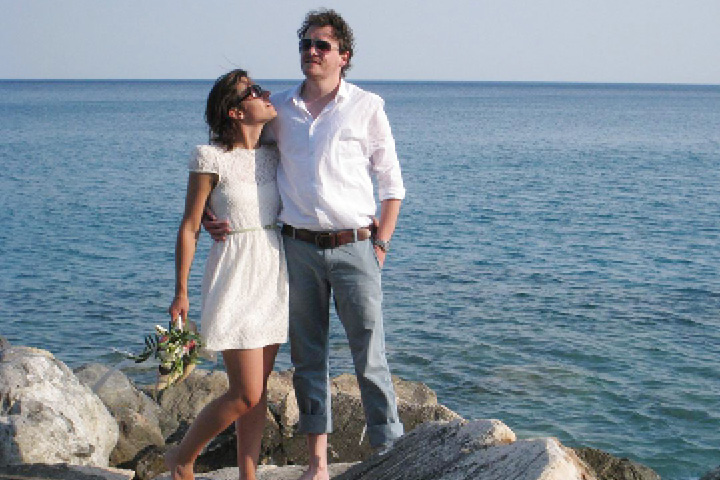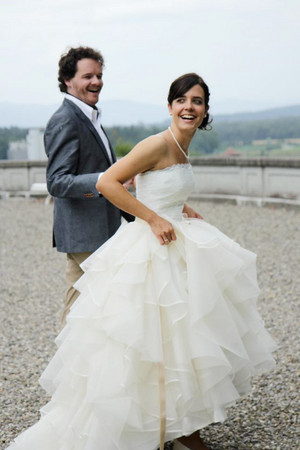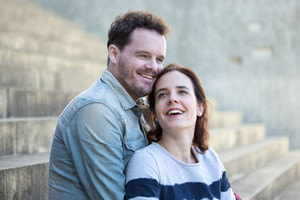
Barbara Hänni has been married to her husband, Markus, for 10 years and they have two daughters. But Markus has the genetic disorder cystic fibrosis. Why did she marry him anyway? What is it like to be in relationship with someone with a chronic disease? Why does the love one feels for someone count more than their physical integrity?
Barbara Hänni: I knew that Markus had cystic fibrosis before I had even met him. One of my girlfriends had told me about him and his chronic disease. As I was getting to know him we didn’t talk about his disease. At that time he was still hiding his disease. He was not as open about then as he is today. The first time that I heard Markus talk about his cystic fibrosis was at a discussion group at our church. We did an exercise so the members of the group could get to know each other better, and we had to talk about something personal, remove our masks, take down our facades. Markus talked about his CF, the therapy and the inhalation he had to do every day, about his statistically shorter life expectancy. Back then I pitied him a lot. I thought: This poor guy! He has to live with so many limitations and he is going to die soon.

Barbara Hänni: No, of course not. I no longer pity him now. Of course I sympathize with him when he feels bad and I feel empathy for his situation, but I no longer look at him full of pity. I see Markus as a very endearing, positive, congenial man who happens to have cystic fibrosis. The disease is part of him, but not the only thing that defines him. I have also gotten used to having this disease as a part of our lives. It has become normal for me.
Barbara Hänni: Because at some point I concluded that there is no greater joy than meeting someone whom you get along well with and love deeply. Should a person forgo this happiness because the person they love is sick? Ironically I came to this conclusion after telling Markus that we could never be a couple. As I said that my thoughts began to swirl around: Is this disease really a no go for a relationship? Does this disease really count more than all the positive things I see in Markus? He is a genial, optimistic guy, with a sense of humour. We laugh a lot, have a similar attitude toward life and similar interests. It is fun to spend time with him. Should I forgo this only because he happens to be sick and might die at a younger age? I work on a cancer ward. And there I see that healthy partners can also suddenly get sick and die. For this reason, after talking to my family and friends, I decided to be with Markus. He is a wonderful guy.
Barbara Hänni: Markus has admirable sense of discipline when it comes to his inhalation therapy. He does it consistently every day, twice a day, without fail. I think that is truly impressive, especially because I am not as disciplined, such as with exercise. When I start something new, I usually throw in the towel after two weeks, so Markus sets a great example for me in terms of discipline. I also like his outlook on life. He is very clear about setting priorities in his life. Healthy people often aren’t that good at this. He always focuses on the person and not their achievements. This is very refreshing in today’s performance-oriented society. And he is very contented despite his disease, although a person in his situation could also be very bitter. Lastly, because of his disease there are some things he cannot do, for example sports, a career or have the option to spontaneously plan his day. Even so, he is happy, and more content than many healthy people.
Barbara Hänni: For one, Markus has limitations associated with being less physically resilient and being absent more often because of infections. For another, we have to plan around his inhalation therapy. He does the inhalation therapy in the morning after breakfast, while I take care of the children or go shopping. Markus withdraws again around 5 p.m. to do his inhalation and breathing therapy. At these times I don’t have any help, but even so our routine works well and this is normal for us. We only find the nebulizer therapy a limitation in unusual situations. Two examples: Leaving at 6 a.m. for an outing is out of the question. For Markus that would mean having to get up at 4 a.m. and being exhausted and dragging all day. We can’t spontaneously spend the night somewhere else after an outing either. His medications and equipment for the inhalation therapy generally are stay at home. So we have to go home so Markus can inhale his medications.
Barbara Hänni: If he could do without the therapy, that would of course be better. But that isn’t an option. His inhalation therapy is absolutely essential. If Markus were to skip an inhalation session, he would immediately have more mucus and more problems. He wouldn’t be able to sleep because he would be coughing all night long. And inhaling antibiotics is also essential because they protect him from bad lung infections and inflammation.
Barbara Hänni: In our family unit I am the rock everyone depends on. Markus doesn’t have a lot of energy and needs to take a lot of breaks. I don’t want to wear him out too much so I do some things alone that other couples would probably do together, like setting up for parties and cleaning up after. Markus is more susceptible to infections that could send him to the hospital suddenly. When Markus is at the hospital, I am basically a single mother. I go to work, take care of the kids and the house by myself.

Barbara Hänni: Sometimes the awareness that I bear most of the responsibility for us as a family weighs heavily. Occasionally I also think I could use a little more help. But basically I am someone who is motivated by the pressure to be the best and who likes taking on responsibility and being in charge. In my partnership with Markus I am challenged every day. And these challenges have their own appeal. I like it when I can use my organizational skills and my ability to cope with pressure. Sometimes my friends say that I have an extremely high level of energy and they sometimes wonder how I am able to do it all. That is a great compliment and is very gratifying to me. Occasionally Markus and I joke that our relationship only works as well as it does because he is sick and and this forces him not to be so involved. If he were healthy, we would probably bicker more because we both want to be in charge. Somehow this disease helps our relationship be harmonious (laughs). Furthermore, because of Markus’s disease I live more intentionally and deliberately because I regularly have to grapple with existential issues.
Note: The statements made in the interview are the individual views of the interviewee. They do not necessarily reflect the PARI view or the general state of science.
An article written by the PARI BLOG editorial team.
© 2025 PARI GmbH Spezialisten für effektive Inhalation